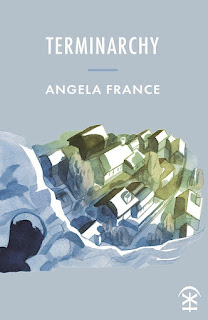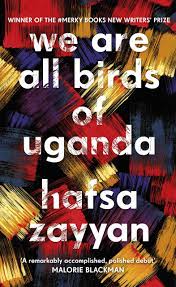At the end of 2021, we asked readers to nominate a favourite read of the year, and write a micro-review of their chosen book. The book could be from any time or genre - the only qualification was that it had to be a book the reader found particularly memorable, striking or enjoyable during the last twelve months. Here below are the responses we received from readers. Everybody's Reviewing wishes all its readers a happy and hopeful new year of reading in 2022!
Kirsten Arcadio
Will Dean, The Last Thing to Burn: "Chosen for its stone-cold thrilling properties, this is a truly excellent novel. Set in a desolate farm somewhere between the East Midlands and Yorkshire it tells the story of an illegal immigrant - a Vietnamese woman - who has been trafficked to the UK in the hope of a better life. The protagonist and villain, a farmer called Len, really rattled me, as did the sheer but horrific plausibility of the scenario the author presents. What’s the sign of a good book? That it stays under your skin afterwards. This one definitely did."
Joe Bedford
Preti Taneja, We That Are Young: "Preti Taneja’s reimagining of King Lear is by turns an intoxicating lyrical odyssey, an urgent dissection of India’s new oligarchy-class, and a brutal commentary on the limits of cruelty, loyalty and family ties. Impossible to forget."
Kathleen Bell
Nadifa Mohamed, The Orchard of Lost Souls: "Offers a gripping perspective on the fairly recent Somali civil war by taking three points of view: the widow Kawsar within her small community; the child Deqo, an outsider in a refugee camp; and Filsan, a young woman soldier loyal to the dictatorial regime. I cared about all these characters and was desperate to know what would happen to them, so I couldn’t stop reading - but then was disappointed when the book ended and there was no more to learn."
Constantine
Garth Nix, Angel Mage: "For me Garth Nix remains second only to Tolkien when it comes to world building. But while Tolkien may have the edge in law and linguistics, Garth wins hands down on 'completed works.' Angel Mage is a stand-alone book; however, it is as rich in law and character as anything he has written, and I think 'beautifully crafted' is an apt description. The protagonists you will care for, every damn one of them. The world seems to exist in a world that is 'bisexual / genderfluid = normal,' and yet has no need to shout it out and call any more attention to itself then any of us would to our own leanings without cause. There is a small love affair with The Three Musketeers going on with some of the names and nuances but if the author hadn’t alluded to it in the foreword I’m not sure I would have noticed. For me the book stands as possibly his greatest stand-alone novel."
Barbara Cooke
Janice Hallett, The Appeal: "Picked this up idly when teaching a few weeks on crime writing and was glued immediately. I was wary that the premise - a murder revealed through a web of emails and texts - sounded gimmicky but it's utterly compelling."
Isobel Copley
Colum McCann, Apeirogon: "Breathtaking, soul searching, life changing; fortunately readable in short bites."
Sally Evans
Kurt Vonnegut, Galápagos: "A funny, witty extravaganza about extreme world conditions -extinction no less - alluding to Darwin's discovery of Galapagos and narrated by a ship's ghost. Horribly relevant today."
Rosa Fernandez
Tim Dowling, How To Be A Husband: "Of all the books I enjoyed this year, this was definitely my favourite. Hysterically funny (and painfully real) in places, Tim's tales of haplessness and his wife's spectacular ability to take it all in her stride were a great comfort. There's no airbrushing or attempt to filter any of the ugly truth about their relationship, and yet ultimately it's a genuine romance. Not that challenging, but there were times in 2021 that I needed an easygoing read and this fit the bill perfectly."
Kershia Field
Elodie Harper, The Wolf Den: "In a world gripped by Covid, like many others I found myself escaping more and more into stories in a bid to forget the world around me. In The Wolf Den, the world I entered was vibrant, thrilling and completely unforgiving. Set in 74AD, the story follows Amara, a Greek doctor's daughter who is sold in to prostitution after her father dies and her mother is unable to provide for her. What follows is a beautiful tale of friendship, bravery, female empowerment but also what it means to be painfully human in a world where everything seems to be against you. Elodie Harper has done what only a handful of writers have succeeded to do and made me laugh and cry in the space of a few hours. I can't recommend this highly enough and I am really looking forward upcoming sequel The House with the Golden Door."
Beth Gaylard
Andrew Michael Hurley, Starve Acre: "Hares in rural-centred fiction tend to be symbols of fragility and innocence, but the creature in this book is a demonic force, thoughtlessly unleashed by a couple grieving for their lost child; powerfully written, well creepy!"Colin Gardiner
Joan Didion, Slouching Towards Bethlehem: "I was stunned by the diamond sharp prose of Slouching Towards Bethlehem. Didion's collection of essays expose the strangeness of 60s Californian life. She takes no prisoners. A vital, singular literary voice."
Asha Krishna
Hafsa Zayyan, We Are All Birds of Uganda: "Walking through the streets of Leicester, I was always curious about the British-Asian connection with the Idi Amin regime. I was aware that this was personal history for many families in the city and yet, for a while, I couldn't find any representation in fiction. And then I came across two: like Neema Shah’s Kololo Hill, and We Are All Birds of Uganda, which allowed me to engage with a part of Asian immigrant history through its engaging plot and vivid characters. An eye-opening experience."
Karen Powell
Helen Dunmore, Zennor in Darkness: "Dunmore blends fiction with real life characters (D. H. Lawrence and his wife) in this novel set in Cornwall during the First World War. Beautifully detailed descriptions took me to the Cornish coast, and away from the reality of 2021."
Karen Rust
Viv Albertine, Clothes, Clothes, Clothes, Music, Music, Music, Boys, Boys, Boys: "It's impossible not to love this memoir of Viv's life at the centre of the emerging London punk scene. A working-class girl, she took up guitar and found herself playing in The Slits, an all-girl band, at a time when women often only sang. Her complete honesty about everything from her sex life to her insecurities is utterly compelling. Her circle included all the main suspects from Lydon to Vicious, Mick Jones to Mclaren and Westwood. A must read."
Ayana Sen-Handley (aged 12)
Robin Stevens, First Class Murder: "The third book in the suspenseful mystery series, A Murder Most Unladylike, First Class Murder perfectly captures the point of view of Hazel Wong, a Chinese girl travelling through Europe on a train famous for murder. When a death on the Orient Express makes Hazel and her best friend Daisy’s trip a lot more exciting than expected, they must solve the murder against all odds, with a little help from new friends and old along the way. The best of all detectives, of course, they succeed in catching the culprit, leaving me in no doubt that this was their most engrossing investigation yet."
Shreya Sen-Handley

Michael Haag, The Durrells of Corfu: "This year of pandemic travel bans has also been, ironically, the year of the travelogue for me, with my own travel book Handle with Care, my third with HarperCollins, poised to come out in a few months, and featuring a chapter on our own Corfu journey. Having grown up with the Durrells’ fabulous stories of this island paradise, I felt the need to revisit those tales, but from other perspectives as well this time; and it was in Michael Haag’s The Durrells of Corfu that I discovered the additional dimensions I’d hoped to find. Energetically taking the story beyond the Durrells’ charmed Corfu sojourn, whilst shedding further light on the many colourful characters that peopled their accounts, Haag doesn’t shatter the enchantment even as he delves into the grittier aspects of the Durrells’ lives, allowing me to fall a little more in love with some of the family, and a little less with others (like Leslie, who doesn’t improve under scrutiny)!"
Syon Sen-Handley (aged 13)
Steve Englehart, Roy Thomas and Gerry Conway, The Incredible Hulk Epic Collection Volume 6: Crisis on Counter Earth: "Hulk boing. Hulk smash. Hulk good!"
Jonathan Taylor
Beth Ann Fennelly, Heating & Cooling: "One of the very best collections of micro- or flash-memoirs I have come across, each memoir a miniature snow-globe of emotion. Here is a place where memoir and poetry converge."
Maria Taylor
Douglas Stuart, Shuggie Bain: "Shuggie Bain was one of my favourite novels of 2021. I practically lived in this novel, written by Douglas Stuart with great sensitivity and realism; a realism which could be described in the time-honoured way as 'gritty,' but was one which was ultimately about the love of a son for his struggling, alcoholic mother."
Miranda Taylor (aged 13)
Ken Wakui, Tokyo Revengers: "Tokyo Revengers is a manga that follows Takemichi learning that he can time travel after he dies to save his girlfriend, as he can travel back to his delinquent phase. He then joins the Tokyo Manji gang to meet the leader Manjiro who becomes another person he wishes to save in the future."
Rosalind Taylor (aged 13)
Syundei, Go for It, Nakamura!: "This is a manga about a boy who is secretly gay. It is drawn in an 80s manga style. Nakamura likes a boy called Hirose. He wants to befriend him but is too shy to do so. I enjoyed the plot and it is very well written, wholesome and cute. They also both have similar interests in marine life."
Paul Taylor-McCartney
Richard Powers, Bewilderment: "A tender, often intimate, portrait of loss and survival and of one boy's mission to save his dying planet. Beautifully written and full of so many surprises that make it both unique and memorable. My book of the year, hands down."
Harry Whitehead
Richard Powers, The Overstory: "I read this 2019 Pulitzer Prize-winning novel about trees, protest and our future in a kind of terrible euphoria, shaken by Powers’ elegiac and tragic writing about trees, exhilarated by the profound characterisation, intricate story structure, and his deep knowledge of the subject."
Lisa Williams
Michael Rosen, Many Different Kinds of Love: "Michael Rosen has touched many of our lives. In 2020 he got poorly. Really poorly. This book is a record of that time and a monumental time in everyone’s lives – the start of the Covid Epidemic. It isn’t just Michael’s story - while he was in a coma the hospital staff that sat with him had the opportunity to share their stories too, in a notebook left by his bed. This isn’t just a book. It’s isn’t just a social history. It’s a reassurance to those that lost friends and relatives in hospitals at that time, that their loved ones probably had the same love and compassion from the NHS staff. It is one of those books that I’ve wanted to pass onto everyone I know since reading it."
Lee Wright
Eric Vuillard, The War of the Poor: "Sixteenth-century Europe and the poor are no longer willing to wait until they get to heaven for equality to be granted to them. Led by Thomas Müntzer, they go in search of it on earth."






























